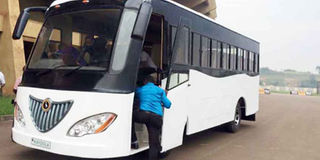E.A states asked to retain 25% tariff on vehicle imports

A solar-powered bus assembled by Kiira Motors. FILE PHOTO
What you need to know:
A lower levy would undermine local assemblers’ dream to develop the automotive industry, Dorothy Nakaweesi writes.
Regional partner states have been asked to maintain a 25 per cent Common External Tariff on both new and used fully built motor vehicles imported into the region to boost productivity of local assembly plants.
Reacting to the 2018/19 budgets, East African Business Council (EABC) said the industry has potential to contribute to an industrialised regional economy by 2032.
Ms Lilian Awinja, EABC chief executive officer, in an interview said a lower levy would undermine local assemblers’ dream to developing the automotive industry.
“The proposal of the stay of application on EAC-CET on motor vehicles for transportation of goods and passengers is likely to frustrate efforts of local motor vehicle assemblers in the region, who will face stiff competition from similar imported vehicles under lower duty rate than agreed,” Ms Awinja said.
Ms Awinja said the capacity of motor vehicle assembly plants in the region is under-utilised and confronted by competition from imported second hand vehicles mainly from Japan and United Arab Emirates.
“This hinders the development of local content supply base, which is dependent on high volume of production,” Ms Awinja added.
She said: “It is also admirable to see that in the budget proposals; the EAC partner states agree to grant a duty remission on importation of completely knocked down kits at a rate of 10 per cent for a period of one year. This encourages local manufacturing and assembly of motorcycles.”
A knocked down kit contains parts needed to assemble a product.
Budgets
In their budgets unveiled two-weeks ago, the EAC partner states had a bitter-sweet deal in relation to the motor vehicle & motor cycle industry.
Rwanda granted stay of application of EAC-CET and apply a duty rate of 10 per cent instead of 25 per cent on road tractors for semi-trailers, motor vehicles for transport goods with gross weight exceeding 20 tonnes and buses for transportation of 50 persons and above.
While, Uganda granted stay of application on EAC-CET and applied a duty rate of 0 per cent instead of 10 per cent on road tractors for semitrailers.
“Uganda proposes to reduce import duty from 25 per cent to 0 per cent on Motor vehicles exceed 20 tonnes; reduction of import duty from 25 per cent to 10 per cent on buses for transportation of more than 25 persons,” Finance minister Matia Kasaija said.
Nevertheless, EABC commended Uganda’s ban on importation of motor vehicles of 15 years and above from the year of manufacture, saying it paves way for the region to embark on harmonisation of age limits of imported vehicles, to boost the motor vehicle industry.
Vehicle assembly
In Uganda, Kiira Motors Corporation (KMC) is planning to manufacture vehicles with production expected to start this year through assembling.
In an interview with this newspaper last year, KMC officials said the company’s products will include Sedans, pick-ups, crosser-overs, buses and trucks. A Sedan costs $25,000, a Crossover $28,000 and $32,000 for a pick-up.
According to KMC, production is supposed to start with 305 vehicles and production is expected to be at full capacity of 60,000 vehicles per year by 2039.
According to an American- based consulting company, RLE International, that conducted the Kiira Motors Business case, the development of infrastructure is estimated to cost $36m (about Shs121b).
Kenya Vehicle Manufacturers, manufactures a motoring unit called Mobius, which is currently available on the market for $10,620 (Shs30.2m).
However, its supply within the region has been limited, with experts saying there are barriers that need to be worked on.
Region
Kenya. In Kenya Vehicle Manufacturer (KVM)—assembles vehicles of CMC and DT Dobie’s trucks and heavy commercial vehicles such as the Nissan double-cab pick-ups, Land Rover, Mazda, Iveco, and Mercedes Benz, Toyota Kenya, Associated Vehicle Assemblers (AVA) and General Motors East Africa (GMEA) are among local assemblers.




